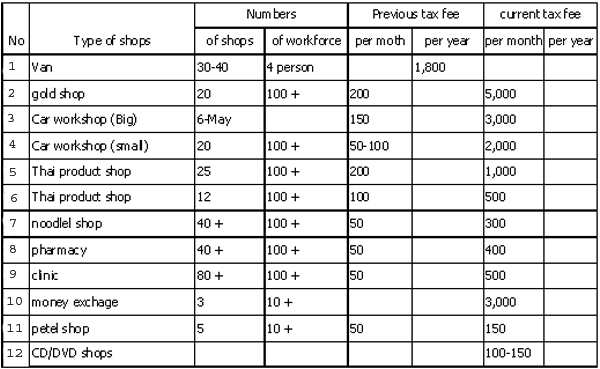Tax fees in Panghsang, headquarters of the strongest non-junta armed group in Burma, the United Wa State Army (UWSA) in northern Shan State, has dramatically increased prompting local people to protest, according to local sources...
Tax fees in Panghsang, headquarters of the strongest non-junta armed group in Burma, the United Wa State Army (UWSA) in northern Shan State, has dramatically increased prompting local people to protest, according to local sources.
Panghsang began collecting taxes on the new rates on 22 March following its annual meeting from 16 March to 20 March.
According to local sources, the group’s announcement did not give any explanation as to why the leadership had decided to increase the tax rates.
“We went to ask them to decrease a bit. It should not have increased that much,” a restaurant owner told SHAN.
“We asked them to wait and see for a while. There will have change if it does not work. Actually, the decision was not taken at the meeting. It came directly from the top,” a Wa officer was quoted as saying.
For instance, a gold shop was before required to pay only 200 Yuan per month, but now has increased to 5,000 Yuan. Panghsang has around 20 gold shops.
Likewise, a car workshop tax was increased from 150 Yuan to 3,000 Yuan while money exchanger’s tax is up to 3,000 Yuan from 300 Yuan. Tax rates for other businesses are as in the following chart:
For vans, Panghsang authorities are taxing them by trips: tax per trip Y 200, Security tax per trip Y 10 and passenger tax, 4 passengers * Y 40 is 160 Y which cost Y 370 in total.
There are around 30 shops for each category, local sources say.
“We are coming to trade here in Panghsang because we could not afford paying a lot of money to the Burmese authorities. But now, they are behaving like the Burmese authorities. There won’t be much for us left if we have to pay that much,” a trader said.
A Sino-Burma border watcher commented that the action could link to the drug trade because the Chinese officials are working with the group to crack down on drugs.
“It has become increasingly difficult for the Wa to deal in drugs. So they just have to increase their income from taxation,” he said.


